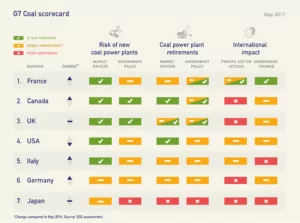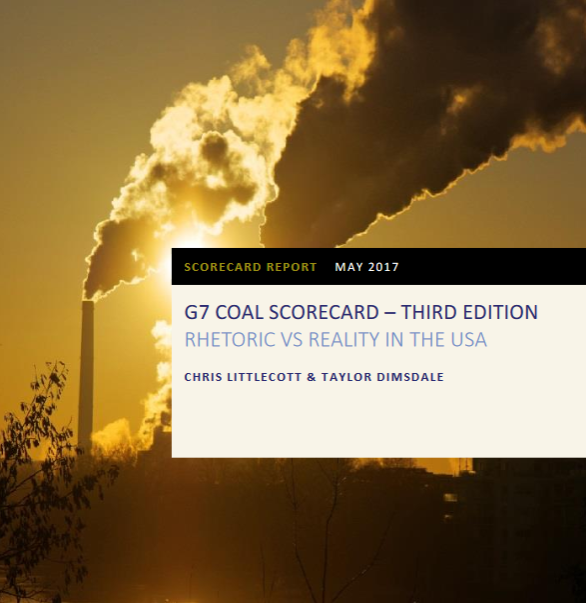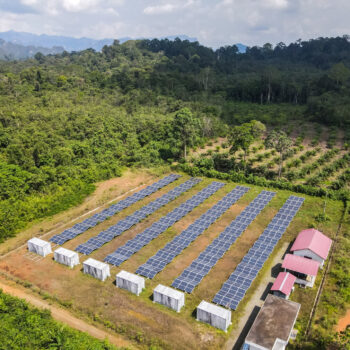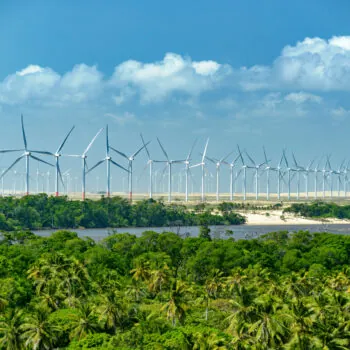The E3G G7 coal scorecard assesses how G7 countries are addressing the challenge of reducing coal-fired power generation. It analyses the market and policy contexts of their domestic use of coal and their international influence.
This third edition of the G7 coal scorecard updates the overall ranking based on developments over the past 12 months. It also provides an assessment of the situation in the USA and the initial impact of the new Trump Administration.
Our analysis has found that the underlying structural transition away from coal remains strong, with increased political commitments by national and regional governments. Canada, France, the UK, Alberta, New York State, Oregon and Berlin are all now introducing policy frameworks to ensure the complete phase out of coal-fired power generation. Italy is currently considering a similar policy as part of its new national energy strategy.
Investment trends across the G7 over the past 12 months confirm the continuing transition away from coal. Our data analysis finds that:
- Cancelled: An additional 7 gigawatt (GW) of proposed new coal plant capacity has been cancelled, now totaling 76GW since 2010. Japan remains the only G7 country pursuing investment in new coal-fired electricity generation, but even it has now seen its first cancellations of proposed new coal plants, totaling 2.2GW.
- Already retired: Overall, 107GW of coal capacity has already closed since 2010. Coal power plant retirements are the dominant structural dynamic in the electricity sector, a trend shared by the rest of the G7 beyond Japan.
- Planned retirements: A further 25GW of existing coal plants have been added to the retirement pipeline for the coming years, which now totals 84GW. 54GW of coal capacity has closure dates announced, while 30GW is now set to close as a result of political commitments by national and regional governments.
These trends will continue to provide a positive foundation for the development of domestic policy frameworks across the G7 that confirm and assist the phase out of coal power generation. The similarities of the policy challenges being faced will also be a motivating force for deepened international cooperation on coal.
The recent ‘pro-coal’ policy moves by the Trump Administration are at odds with this progress. Furthermore they do not align with the underlying structural shifts underway in the electricity sector in the USA. As a result, the Trump Administration appears to be trying to turn back the tide in its efforts to create a ‘pro-coal’ agenda.
For this update of the G7 coal scorecard ranking, we again reviewed the status of market drivers and government policies in each country to provide comparable assessments of performance. We considered whether there is a risk of new coal power plants being constructed; whether existing coal power plants are being retired; and whether a country’s actions have a positive international impact. These performance assessments are then aggregated to provide a composite scorecard ranking, as shown in Figure 1 below.
Figure 1: G7 Coal scorecard assessment

Source: E3G analysis
Changes in ranking since May 2016:
The USA drops from first to fourth position in the G7 scorecard ranking. This reflects the recent federal government actions of the new Trump Administration that seek to support coal both domestically and internationally.
Contrary to this ‘pro-coal’ policy agenda, the USA continues to score the highest of all the G7 countries in respect to the alignment of market drivers. The ageing US coal fleet is faced with continued competition from gas and renewables. These point to a continued transition away from coal in the electricity sector despite attempted policy interventions.
Market dynamics and policy efforts are now visibly pulling in different directions in the USA. If this continues it is likely to increase the risk of a disorderly transition rather than a managed pathway. These risks are already being amplified by some of the Trump Administration’s initial social policy and budgetary proposals. Changes proposed to pensions, healthcare and regional economic development are projected to impact negatively on workers and communities in coal regions.
Despite the intense ‘pro-coal’ political rhetoric of the Trump Administration, we have assessed that the status of intended policy changes does not yet meet the threshold for the USA to be ranked as a ‘poor performer’ in the relevant scorecard categories. The majority of the proposed policy changes are currently still only statements of intent which will be subject to lengthy implementation timelines and legal challenge.
As a consequence, the USA drops to a mid-table position in the G7 coal scorecard ranking. Its positive market dynamics continue to provide a foundation for proactive management of the transition away from coal, a challenge which is increasingly being taken on by individual states.
Despite maintaining its positive scores from 2016, the UK has been overtaken in the ranking by France and Canada as they also take forward domestic commitments to phase out coal. All three countries are taking similar positive steps and are well placed to lead wider international cooperation on coal. France and Canada now take first and second place in the ranking.
Italy and Germany have both also improved their performance in the scorecard over the past 12 months. Italy is considering a national coal phase out policy, while the city-region of Berlin has already implemented one.
Japan remains in last place with no change in score, in an unwelcome position as the sole G7 country actively seeking to build new coal power plants.
In considering these trends and next steps for G7 members, we highlight that:
- Despite the current ‘pro-coal’ approach of the new Trump Administration, G7 members will continue to face a shared transition challenge over the coming decades. Together with other OECD partners, the G7 can seek to provide a more orderly pathway through sharing best practice in power sector policy and the delivery of a just transition for affected regions and workers.
- Internationally, G7 members can act to limit public finance to coal power generation. Canada, France, Germany, Italy, and the UK are all now members of the Asian Infrastructure Investment Bank (AIIB) and should prioritise cooperation with China to ensure that the AIIB effectively restricts finance to unabated coal.
- There is an undoubted risk that the ‘pro-coal’ positioning of the new Trump Administration could give political cover to Japan’s promotion of coal technology exports (and similarly encourage other ‘pro-coal’ interests and countries seeking to secure demand for coal). However, we would caution other countries to take a long hard look at the underlying structural trends at play in the USA. There are strong reasons to pay more attention to the reality of electricity sector shifts away from coal rather than getting caught up in the political rhetoric.
- The next two years will see the G7 Presidency held by Canada and France. Prime Minister Trudeau and President Macron have both made strong commitments to delivering a domestic coal phase out. They should seek to use their forthcoming G7 roles to leverage this influence internationally.


